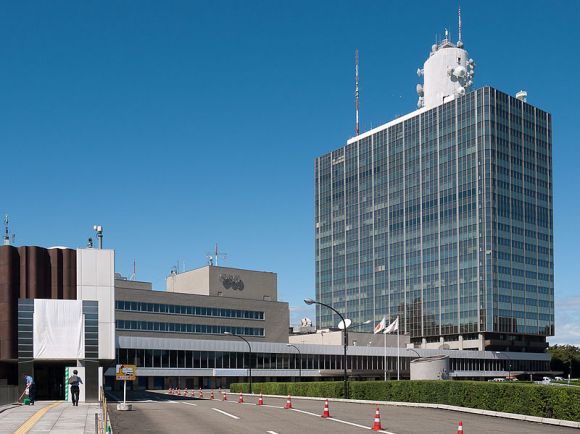
Last year, we brought you news of a court ruling in Yokohama which stipulated that anyone who owns a device capable of receiving a TV signal, regardless of whether they’ve entered into a contract with NHK (Japan’s public broadcasting station) or not, is legally obligated to pay the NHK licensing fee. An important point to note is that the fees are only paid once per household, and not according to the number of TV sets or devices capable of receiving a signal in the house.
However, a recent court decision seems to be taking the issue of NHK licensing fees in a whole new direction. On October 9, Tokyo District Court ruled in a first-of-its-kind lawsuit that the management company behind three Tokyo hotels must first enter into a contract with the public broadcaster. Furthermore, the hotels, all three of which had refused to enter into contracts despite repeated requests from NHK, must also pay their overdue licensing fees in proportion to the number of hotel rooms with TVs.
Just wait til you read how much money that all comes out to be…
Foreign residents of Japan: What do you do when the NHK fee collector comes knocking at your door? Do you fork over the money obediently? Or do you try to drive him away by stuttering excuses such as, “I don’t own a TV”?
While many people (Japanese included) flat-out refuse to pay the monthly fees, maintaining that even though they own a TV they never watch NHK broadcasts anyway, the recent ruling by Tokyo District Court Judge Kenkichi Sakuma identifies a section in the Japanese Broadcast Act which states that any individual who is the owner of a device capable of TV reception is technically bound by obligation to enter into a contract with NHK. As a result, he ordered the aforementioned hotels to both open a contract with NHK and to pay their unpaid fees from the period of August 2013 through May 2014 according to the number of TV-equipped rooms in the hotels.
According to the Asahi Digital, the hotels have approximately 280 rooms with television sets, along with units in the dining area and other locations. Taking these numbers into account, the total unpaid licensing fees that the hotels’ management company must pay adds up to a staggering 6.21 million yen (US$57,851).
Whether you’re an avid viewer of NHK or not, perhaps this comment from a Japanese net user sums up the entire court decision best:
“It’s a great win for the electronic yakuza.”
Sources: Livedoor Blog (Itai News), NHK News, Asahi Digital
Top image: Wikipedia (Rs1421)

 Court ruling orders anyone with a TV-equipped device to pay NHK’s public broadcasting license fee
Court ruling orders anyone with a TV-equipped device to pay NHK’s public broadcasting license fee Tokyo woman with signal blocked-TV loses appeal contesting her obligation to pay NHK fees
Tokyo woman with signal blocked-TV loses appeal contesting her obligation to pay NHK fees Japan’s public broadcaster wins landmark court case and 12 bucks
Japan’s public broadcaster wins landmark court case and 12 bucks Tokyo woman, only person to win court case against Japan’s public broadcaster, told to pay up
Tokyo woman, only person to win court case against Japan’s public broadcaster, told to pay up Leader of political party that refuses to pay NHK ordered to pay NHK
Leader of political party that refuses to pay NHK ordered to pay NHK Viral Japanese cheesecake from Osaka has a lesser known rival called Aunt Wanda
Viral Japanese cheesecake from Osaka has a lesser known rival called Aunt Wanda Ramen for 99 yen?!? Best value-for-money noodles found at unlikely chain in Japan
Ramen for 99 yen?!? Best value-for-money noodles found at unlikely chain in Japan Lawson adds doughnuts to its convenience store sweets range, but are they good enough to go viral?
Lawson adds doughnuts to its convenience store sweets range, but are they good enough to go viral? The best Hobonichi diaries, covers and stationery for 2026
The best Hobonichi diaries, covers and stationery for 2026 Japan’s craziest burger chain takes menchi katsu to new extreme levels
Japan’s craziest burger chain takes menchi katsu to new extreme levels Japanese restaurant chain serves Dragon Ball donuts and Senzu Beans this spring
Japanese restaurant chain serves Dragon Ball donuts and Senzu Beans this spring Mt Fuji railway project receives approval from Yamanashi officials
Mt Fuji railway project receives approval from Yamanashi officials Which convenience store onigiri rice balls are the most popular? Survey reveals surprising results
Which convenience store onigiri rice balls are the most popular? Survey reveals surprising results Extreme Budget Travel! Can you do a trip to Manila with 50,000 yen (US$333)? – Part 2
Extreme Budget Travel! Can you do a trip to Manila with 50,000 yen (US$333)? – Part 2 Can we be just like Shohei Ohtani on a budget with a Hello Kitty cap?
Can we be just like Shohei Ohtani on a budget with a Hello Kitty cap? Starbucks Japan releases first-ever Hinamatsuri Girls’ Day Frappuccino
Starbucks Japan releases first-ever Hinamatsuri Girls’ Day Frappuccino Highest Starbucks in Japan set to open this spring in the Tokyo sky
Highest Starbucks in Japan set to open this spring in the Tokyo sky Tokyo Skytree turns pink for the cherry blossom season
Tokyo Skytree turns pink for the cherry blossom season Japan Extreme Budget Travel! A trip from Tokyo to Izumo for just 30,000 yen [Part 1]
Japan Extreme Budget Travel! A trip from Tokyo to Izumo for just 30,000 yen [Part 1] Yakuzen ramen restaurant in Tokyo is very different to a yakuza ramen restaurant
Yakuzen ramen restaurant in Tokyo is very different to a yakuza ramen restaurant Japan has only one airport named after a samurai, so let’s check out Kochi Ryoma【Photos】
Japan has only one airport named after a samurai, so let’s check out Kochi Ryoma【Photos】 Japanese drugstore sells onigiri at pre-stupid era prices, but how do they compare to 7-Eleven?
Japanese drugstore sells onigiri at pre-stupid era prices, but how do they compare to 7-Eleven? Japan Extreme Budget Travel! A trip from Tokyo to Izumo for just 30,000 yen [Part 2]
Japan Extreme Budget Travel! A trip from Tokyo to Izumo for just 30,000 yen [Part 2] Adorable Totoro acorn key holders come with a special guest hidden inside[Photos]
Adorable Totoro acorn key holders come with a special guest hidden inside[Photos] Japan’s newest Shinkansen has no seats…or passengers [Video]
Japan’s newest Shinkansen has no seats…or passengers [Video] Starbucks Japan releases new sakura goods and drinkware for cherry blossom season 2026
Starbucks Japan releases new sakura goods and drinkware for cherry blossom season 2026 Foreigners accounting for over 80 percent of off-course skiers needing rescue in Japan’s Hokkaido
Foreigners accounting for over 80 percent of off-course skiers needing rescue in Japan’s Hokkaido Super-salty pizza sends six kids to the hospital in Japan, linguistics blamed
Super-salty pizza sends six kids to the hospital in Japan, linguistics blamed Starbucks Japan unveils new sakura Frappuccino for cherry blossom season 2026
Starbucks Japan unveils new sakura Frappuccino for cherry blossom season 2026 Foreign tourists in Japan will get free Shinkansen tickets to promote regional tourism
Foreign tourists in Japan will get free Shinkansen tickets to promote regional tourism The 10 most annoying things foreign tourists do on Japanese trains, according to locals
The 10 most annoying things foreign tourists do on Japanese trains, according to locals Take a trip to Japan’s Dododo Land, the most irritating place on Earth
Take a trip to Japan’s Dododo Land, the most irritating place on Earth Naruto and Converse team up for new line of shinobi sneakers[Photos]
Naruto and Converse team up for new line of shinobi sneakers[Photos] Is China’s don’t-go-to-Japan warning affecting the lines at a popular Tokyo gyukatsu restaurant?
Is China’s don’t-go-to-Japan warning affecting the lines at a popular Tokyo gyukatsu restaurant? Survey asks foreign tourists what bothered them in Japan, more than half gave same answer
Survey asks foreign tourists what bothered them in Japan, more than half gave same answer Japan’s human washing machines will go on sale to general public, demos to be held in Tokyo
Japan’s human washing machines will go on sale to general public, demos to be held in Tokyo Starbucks Japan releases new drinkware and goods for Valentine’s Day
Starbucks Japan releases new drinkware and goods for Valentine’s Day We deeply regret going into this tunnel on our walk in the mountains of Japan
We deeply regret going into this tunnel on our walk in the mountains of Japan Studio Ghibli releases Kodama forest spirits from Princess Mononoke to light up your home
Studio Ghibli releases Kodama forest spirits from Princess Mononoke to light up your home Major Japanese hotel chain says reservations via overseas booking sites may not be valid
Major Japanese hotel chain says reservations via overseas booking sites may not be valid Put sesame oil in your coffee? Japanese maker says it’s the best way to start your day【Taste test】
Put sesame oil in your coffee? Japanese maker says it’s the best way to start your day【Taste test】 No more using real katana for tourism activities, Japan’s National Police Agency says
No more using real katana for tourism activities, Japan’s National Police Agency says NHK loses court case to Tokyo woman who can’t watch it because her TV has a blocker installed
NHK loses court case to Tokyo woman who can’t watch it because her TV has a blocker installed Don’t want to pay your NHK TV licence fee? Beat Takeshi doesn’t think you should have to
Don’t want to pay your NHK TV licence fee? Beat Takeshi doesn’t think you should have to NHK announces “substantial” fee reduction, Japanese Internet reacts with jeering
NHK announces “substantial” fee reduction, Japanese Internet reacts with jeering TVs that don’t show TV selling out fast in Japan
TVs that don’t show TV selling out fast in Japan NHK can now pester you through your mail thanks to new service from Japan Post
NHK can now pester you through your mail thanks to new service from Japan Post “NHK Repelling Stickers” free for anyone wanting to keep away Japan’s public TV fee collectors
“NHK Repelling Stickers” free for anyone wanting to keep away Japan’s public TV fee collectors Japan’s public broadcaster goes thug-style, tags the house of man who refuses to pay fees
Japan’s public broadcaster goes thug-style, tags the house of man who refuses to pay fees Japan’s public broadcaster leaving threatening notes on people’s doorsteps
Japan’s public broadcaster leaving threatening notes on people’s doorsteps Man arrested for spraying Japan’s public broadcasting fee collector with fire extinguisher
Man arrested for spraying Japan’s public broadcasting fee collector with fire extinguisher NHK bill collector arrested for kissing woman on the job: “I thought we were hitting it off!”
NHK bill collector arrested for kissing woman on the job: “I thought we were hitting it off!” W.T.F. Japan: Top 5 ways to get rid of the annoying door-to-door NHK guy 【Weird Top Five】
W.T.F. Japan: Top 5 ways to get rid of the annoying door-to-door NHK guy 【Weird Top Five】 Hotel guest who boiled crabs in room’s kettle angry to have to pay for damages
Hotel guest who boiled crabs in room’s kettle angry to have to pay for damages Chef at top Tokyo sushi restaurant wins lawsuit after being fired for maybe having a tattoo
Chef at top Tokyo sushi restaurant wins lawsuit after being fired for maybe having a tattoo More than a capsule hotel, downtown Tokyo capsule ryokan is awesome, budget-friendly spot to stay
More than a capsule hotel, downtown Tokyo capsule ryokan is awesome, budget-friendly spot to stay